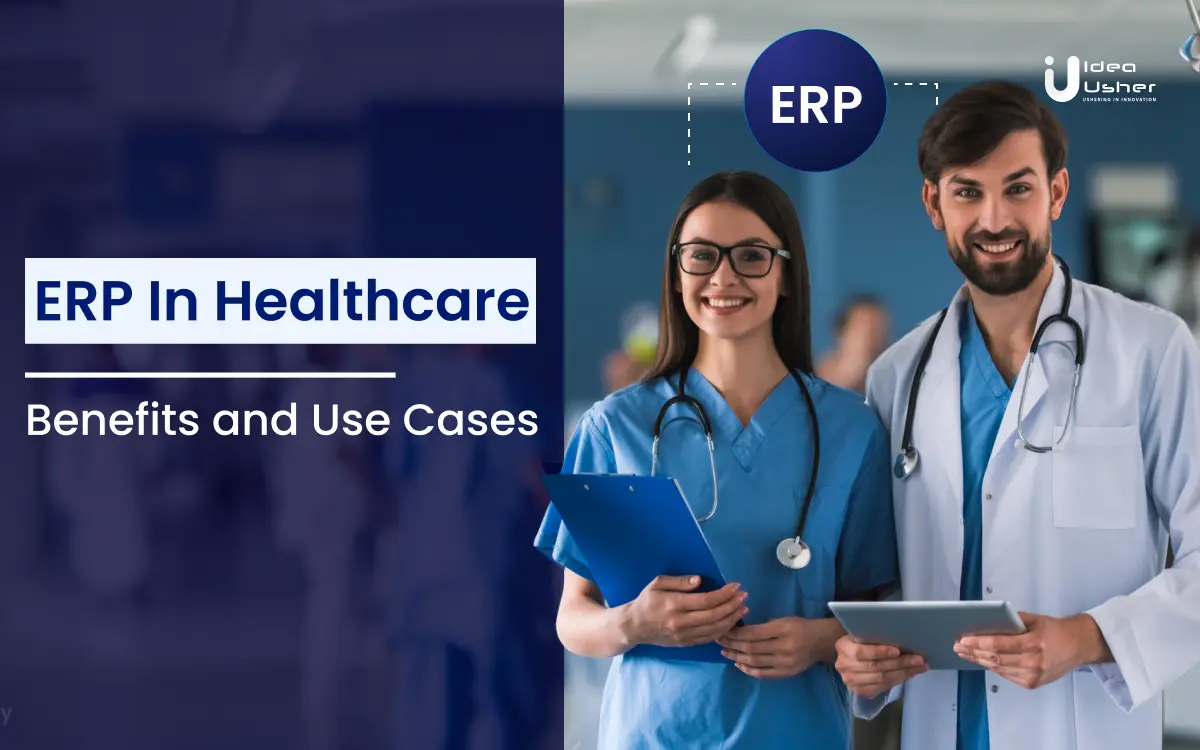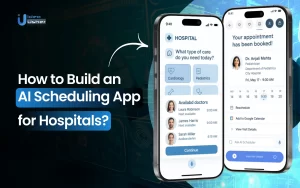Enterprise Resource Planning (ERP) systems have long been associated with industries like manufacturing and finance. However, their implementation in the healthcare sector is gaining traction, offering a range of benefits and promising use cases. In this article, we’ll delve into the advantages of using ERP in healthcare settings and explore real-world examples of its application. From streamlining operations to enhancing patient care, ERP solutions are poised to revolutionize the way healthcare organizations operate. Join us as we uncover the potential benefits and compelling use cases of ERP in the healthcare industry.
What is ERP in Healthcare?
Enterprise Resource Planning (ERP) in healthcare refers to a system that integrates various processes into a unified platform, optimizing data management, resource allocation, and decision-making. This centralized approach fosters efficient communication and collaboration, with tailored systems addressing specific industry needs and functions to enhance overall organizational efficiency.
In the healthcare sector, there are distinct types of ERP solutions:
- Hospital ERP Systems: These systems integrate finance, administration, patient management, and inventory control to enhance operational efficiency.
- Clinical ERP Systems: Designed to improve clinical workflows, these systems centralize patient data, support electronic health records (EHR), and facilitate communication among healthcare professionals.
- Pharmaceutical ERP Systems: These systems oversee the entire supply chain for pharmaceutical companies, from production and inventory control to ensuring regulatory compliance and facilitating efficient distribution.
- Health Insurance ERP Systems: These systems streamline policy management, claims processing, and adherence to healthcare regulations for health insurance providers.
- Healthcare Financial ERP Systems: These systems handle financial data, including medical billing processes, revenue cycle management, and financial statements, ensuring accurate and transparent financial processes within healthcare organizations.
The choice of ERP software depends on the unique requirements and objectives of the healthcare organization or sector.
The benefits of ERP in healthcare are significant, including improved data security and privacy, efficient human resource management, and facilitation of streamlined workflows. As healthcare evolves, integrating ERP solutions becomes essential in addressing the complex challenges faced by providers and administrators.
Also read, “6 Best Financial ERP Software“
Key Market Takeaways of ERP in Healthcare
According to GrandViewResearch, The U.S. healthcare ERP market is witnessing substantial growth, driven by factors such as the urgent need to break data silos, automate tasks, and enhance information flow across various departments. With an estimated worth of USD 1.89 billion in 2022, this market is projected to expand at a compound annual growth rate (CAGR) of 6.2% from 2023 to 2030. The adoption of ERP solutions across industries, including healthcare, underscores a strategic shift towards improving operational efficiencies and resource utilization.
Source: GrandViewResearch
One of the primary drivers behind the increasing adoption of ERP in the U.S. healthcare sector is the promise of heightened caregiving efficiency and optimized resource allocation. By leveraging ERP software, healthcare organizations can streamline their processes, reduce redundancies, and enhance overall productivity. Additionally, the ability to integrate disparate systems and data sources enables better decision-making and resource management, ultimately leading to improved patient care outcomes.
Prominent players in the U.S. healthcare ERP market, such as Epic Systems Corporation, Cerner Corporation, and McKesson Corporation, are at the forefront of driving innovation and shaping the industry landscape. Their comprehensive ERP solutions cater to the unique needs of healthcare organizations, offering robust functionalities for data management, analytics, and decision support. As healthcare providers continue to prioritize efficiency and patient-centric care delivery, the demand for ERP solutions is expected to surge, further propelling market growth and innovation.
Benefits of ERP in Healthcare
Here are some of the benefits of ERP in Healthcare,
1. Facilitated Access to Medical Records
ERP solutions provide a centralized platform for storing and accessing medical records, enabling healthcare providers to swiftly retrieve patient information. This improves efficiency and enhances patient care.
Integrating with Latest Technologies
- Blockchain Integration: Incorporate blockchain technology to establish a secure and immutable repository of patient data, accessible to authorized healthcare providers with patient consent.
- AI-driven Search Tools: Implement advanced AI-powered search algorithms to swiftly retrieve pertinent patient information, even from disparate and unstructured data sources.
2. Enhanced Medical Care through Cloud and E-Storage
Cloud-based ERP solutions offer improved medical care by providing secure, remote access to critical patient data. This advancement can enhance the efficiency of healthcare delivery and lead to better patient outcomes.
Integrating with Latest Technologies
- AR/VR Applications: Employ augmented reality (AR) and virtual reality (VR) for remote medical consultations and training sessions, enhancing accessibility and engagement.
- Utilization of 5G Networks: Harness the capabilities of 5G networks for seamless transmission of medical data in real-time and facilitating remote surgical procedures.
3. Reduced Errors and Operational Costs
ERP solutions contribute to error reduction and decreased operational costs in healthcare organizations. By streamlining processes, automating tasks, and offering real-time data, they foster more efficient operations and cost savings.
Integrating with Latest Technologies
- Automation with Robotics Process Automation (RPA): Introduce RPA bots to automate repetitive administrative tasks, enabling staff to focus on more critical responsibilities.
- Integration of Internet of Things (IoT): Connect medical devices to IoT networks for performance monitoring, predictive maintenance, and minimizing operational downtime.
4. Business Intelligence (BI) and Strategic Planning
Healthcare ERP solutions often incorporate business intelligence tools that aggregate and analyze data to offer insights. These insights aid in strategic planning, empowering healthcare organizations to make data-driven decisions for enhanced patient care and operational efficiency.
Integrating with Latest Technologies
- Machine Learning Analysis: Utilize ML algorithms for in-depth analysis of vast datasets, uncovering hidden patterns and insights to support informed decision-making.
- Deployment of Predictive Analytics: Implement predictive analytics solutions to forecast resource requirements, anticipate patient readmissions, and preempt potential outbreaks.
5. Organization-Wide Integration
ERP solutions integrate various departments within healthcare organizations, fostering smoother communication and operations. This integration promotes improved efficiency and patient care across the organization.
Integrating with Latest Technologies
- API Connectivity: Establish seamless data flow and collaboration across departments by integrating ERP systems with other applications and platforms through APIs.
- Empowerment with Low-code/No-code Development: Enable non-technical users to develop custom integrations and automate workflows without extensive coding knowledge.
6. Enhanced Industry Compliance
ERP solutions assist healthcare organizations in complying with industry regulations by providing tools for managing compliance-related tasks. This encompasses managing patient data and ensuring billing processes align with regulations.
Integrating with Latest Technologies
- AI-driven Compliance Solutions: Leverage AI to automate compliance checks, identify regulatory risks, and ensure adherence to evolving healthcare regulations.
- Utilization of Blockchain for Audit Trails: Employ blockchain technology to create immutable audit trails for patient data, simplifying compliance audits and ensuring data integrity.
Also read, “Top 5 AI App Trends in 2024“
7. Effective Financial Management
ERP solutions commonly integrate financial management modules, aiding healthcare organizations in effectively managing their finances. This encompasses tasks such as billing, invoicing, and revenue cycle management.
Integrating with Latest Technologies
- Implementation of Chatbots: Deploy chatbots to handle patient billing inquiries and automate payment processes, enhancing efficiency and patient satisfaction.
- Leveraging Big Data Analytics: Utilize big data analytics tools to analyze financial data, identify cost-saving opportunities, and optimize resource allocation.
8. Human Capital Management
Certain ERP solutions, such as Workday, offer features for Human Capital Management (HCM), assisting healthcare organizations in managing their workforce efficiently. This is crucial for upholding high-quality patient care standards.
Integrating with Latest Technologies
- Integration of Virtual Assistants: Incorporate virtual assistants within the ERP system to streamline employee scheduling, address HR queries, and optimize onboarding processes.
- Utilization of Talent Analytics: Employ talent analytics tools to identify top-performing employees, predict skill gaps, and tailor training programs accordingly.
9. Inventory Control
ERP solutions also facilitate inventory control, a vital aspect within the healthcare sector, especially concerning the distribution and management of medical supplies.
Integrating with Latest Technologies
- Smart Sensor Integration: Equip medical supplies with smart sensors to monitor inventory levels in real time and automate reordering processes, ensuring optimal inventory management.
- Utilization of 3D Printing Technology: Implement 3D printing technology to produce customized medical supplies on-demand, reducing inventory requirements and lead times.
10. Risk and Compliance Management
ERP software plays a key role in assisting organizations in managing risk and compliance-related tasks, ensuring adherence to industry regulations.
Integrating with Latest Technologies
- Integration of Cybersecurity Tools: Incorporate advanced cybersecurity measures into the ERP system to safeguard patient data against cyber threats and uphold data privacy standards.
- Real-time Risk Monitoring: Implement real-time risk monitoring solutions to identify and mitigate potential issues before they escalate, ensuring proactive risk management.
11. Streamlined Supply Chain Management
ERP solutions are instrumental in managing supply chain operations within healthcare organizations, guaranteeing the availability of necessary supplies and equipment for optimal patient care delivery.
Integrating with Latest Technologies
- Blockchain-enabled Supply Chains: Utilize blockchain technology to track the origins of medical supplies, enhance transparency, and combat counterfeiting in the supply chain.
- Exploration of Autonomous Delivery Vehicles: Investigate the feasibility of autonomous delivery vehicles for efficient and cost-effective transportation of medical supplies.
Also read, “How to Develop a Blockchain Platform like EOS?“
How do ERPs help in scaling your Healthcare Business?
During events like the COVID-19 pandemic, healthcare institutions swiftly adjusted to evolving regulations and guidelines. ERP systems played a vital role in efficiently managing these changes, enabling organizations to deliver care while adhering to new protocols.
- Scalability of ERP Solutions: ERP solutions have proven indispensable in aiding healthcare organizations to expand their operations. As institutions grow, managing increased patient loads, staff, and resources becomes crucial. ERP systems exhibit remarkable scalability, effortlessly accommodating this growth and ensuring continued operational efficiency.
- Tackling Inefficiencies: ERP systems have effectively tackled inefficiencies in numerous healthcare settings. For instance, hospitals utilize ERP platforms to optimize patient admission processes, significantly reducing admission times and enhancing overall patient satisfaction.
- Workflow Optimization: ERP systems play a pivotal role in streamlining workflows within healthcare institutions. For example, hospitals leverage ERP solutions to automate billing procedures, resulting in reduced billing cycles and improved billing accuracy.
- Revenue Enhancement and Predictability: By enhancing efficiency and reducing costs, ERP systems contribute to revenue growth in healthcare organizations. For instance, hospitals employing ERP systems for supply chain management witness lowered procurement expenses, consequently boosting revenue.
- ERP Integration in Healthcare: Many healthcare providers have seamlessly integrated ERP systems into their operations. For instance, hospitals utilize ERP platforms to manage patient records, ensuring data accuracy and timeliness.
How to Deploy ERP in Healthcare?
Here’s how you can integrate an ERP solution in healthcare,
1. Choosing a Healthcare ERP Solution
Choose and/or build a custom healthcare enterprise resource-planning solution: This involves selecting an ERP system that fits the needs of your healthcare organization or building a custom one.
Key considerations include primary data compliance, patient management capabilities, and support for third-party integrations to ensure interoperability.
2. Configuring Medical ERP Components and Modules
Configuring the components and modules of a medical ERP system involves customizing the system to align with the particular needs of the healthcare organization. This process includes setting up modules for patient care, treatment management, relationship management, and other essential functions to optimize system performance and usability.
3. Managing PHI Migration Between Systems
Effective management of Protected Health Information (PHI) migration between systems is critical to maintaining data integrity and security during ERP system implementation. Healthcare organizations must adhere to stringent protocols to safeguard PHI during the migration process, ensuring compliance with regulatory requirements and protecting sensitive patient data.
4. Executing API and Cloud Integrations
API and cloud integrations play a vital role in enhancing the functionality and interoperability of healthcare ERP systems. These integrations enable seamless data exchange between different systems, facilitating efficient communication and collaboration across various healthcare platforms and applications.
5. Strategic Planning and Operational Analysis
ERP systems empower healthcare organizations with real-time data and insights, enabling strategic planning and operational analysis. By leveraging comprehensive data analytics, healthcare providers can make informed decisions, optimize resource allocation, and enhance operational efficiency to deliver high-quality patient care effectively.
6. Supply-chain management
ERP systems streamline supply-chain management in healthcare organizations by providing real-time visibility into inventory levels and optimizing procurement processes. Enhanced inventory tracking and management capabilities enable healthcare providers to optimize resource utilization, minimize wastage, and ensure timely availability of critical supplies and medications.
7. Clinical Assets and Inventory Management
ERP systems facilitate efficient tracking and documentation of inventory levels for medical supplies, equipment, and pharmaceuticals in real time. By centralizing inventory management processes, healthcare organizations can optimize resource allocation, reduce inventory costs, and ensure adequate availability of clinical assets to support patient care delivery.
8. Financial Workflows and Billing
ERP systems automate financial workflows, including patient billing, insurance claims processing, and medical payroll management. By streamlining administrative tasks, such as payroll processing and benefits administration, healthcare providers can minimize errors, reduce administrative costs, and improve overall financial management efficiency.
9. Managing Clinical Processes
ERP systems enhance patient care delivery by streamlining clinical processes, such as access to precise patient records, appointment scheduling, and staff communication. By optimizing clinical workflows and improving communication channels, healthcare organizations can enhance patient experiences, improve care coordination, and drive better health outcomes.
10. Human Resource Management
ERP systems streamline HR processes in healthcare organizations, automating tasks such as payroll processing, benefits administration, and attendance tracking. By centralizing HR functions within a unified platform, healthcare providers can improve workforce management efficiency, ensure compliance with regulatory requirements, and optimize employee productivity and engagement.
Also read, “AI in ERP: Benefits and Use Cases”
An Interesting Case Study of ERP in Healthcare App: SAP Business ByDesign (ByD)
SAP Business ByDesign (ByD) is a cloud-based enterprise resource planning (ERP) software provided by SAP SE, operating as software as a service (SaaS). It caters specifically to small and medium-sized enterprises (SMEs), offering comprehensive business processes across various areas such as financials, human resources, sales, product management, and purchasing. Embedded within the software are features like business analytics, mobility, e-learning, and support.
Key Features:
- Pre-built Processes: ByD delivers pre-configured processes for a range of functions including finance, sales, product management, and purchasing, all within a unified solution.
- Integration and Analytics: It seamlessly connects every function across a company while providing in-depth analytics to drive informed decision-making.
- Streamlined End-to-End Processes: ByD offers streamlined end-to-end processes to enhance operational efficiency and productivity.
How Can It Help the Healthcare Sector?
SAP Business ByDesign (ByD) presents significant advantages for the healthcare sector:
- Integrated Solution: ByD offers a comprehensive ERP solution covering various business operations crucial for healthcare facilities. From financial management to procurement, compliance, supplier relationships, and HR, it provides an integrated platform to manage diverse functions efficiently.
- Streamlined Operations: ByD’s embedded business analytics, mobility, e-learning, and support features facilitate streamlined operations for healthcare organizations. This aids in optimizing processes and ultimately enhances the delivery of high-quality patient care.
- Scalability: ByD is tailored for small and medium-sized enterprises, ensuring scalability to accommodate the evolving needs of healthcare organizations. Whether expanding services or scaling operations, ByD can adapt accordingly, providing flexibility for growth.
- Data Compliance and Patient Management: ByD includes features crucial for healthcare settings, such as robust data compliance measures and support for patient management. These features ensure adherence to regulatory standards and enable effective patient care management.
- Third-Party Integrations: ByD offers compatibility with other healthcare software, enabling seamless integration and interoperability. This capability allows healthcare organizations to leverage existing systems while maximizing the utility of ByD.
Business Growth
Since its inception in 2007, SAP Business ByDesign has evolved into a reliable ERP solution for fast-growing and medium-sized businesses. Currently, over 15,264 companies in 165 countries rely on Business ByDesign for their backend functions, indicating a growth rate of 21 percent year-over-year.
The platform is supported by more than 200 software solution partners, 250 value-added partners, and approximately 12,220 add-on solutions, further enhancing its versatility and adaptability to various business needs.
Conclusion
Implementing an Enterprise Resource Planning (ERP) system in healthcare can revolutionize the way medical institutions operate. It streamlines processes, enhances communication, improves data accuracy, and ultimately leads to better patient care outcomes. With the ability to integrate various functions such as patient management, inventory control, billing, and scheduling, ERP systems offer a comprehensive solution to the complex challenges faced by healthcare organizations.
By leveraging ERP technology, healthcare providers can optimize resource utilization, reduce administrative burdens, and allocate more time and resources to delivering quality patient care. Additionally, the data-driven insights provided by ERP systems enable informed decision-making, leading to greater efficiency and cost savings in the long run.
Looking to Implement ERP in Healthcare for Your Business?
Are you interested in harnessing the power of ERP in Healthcare to revolutionize your medical institution’s operations? Look no further! Ideausher offers comprehensive solutions tailored to your specific needs, from mobile app to web app development. Our team of experts specializes in creating customized ERP solutions that seamlessly integrate with your existing systems, enabling you to streamline processes, enhance communication, and deliver superior patient care. Contact us today to learn how Ideausher can help you unlock the full potential of ERP in Healthcare!
Work with Ex-MAANG developers to build next-gen apps schedule your consultation now
FAQs
Q1: What is the use of ERP in healthcare?
A1: Enterprise Resource Planning (ERP) systems in healthcare serve as comprehensive software solutions designed to streamline and integrate various administrative and clinical processes within healthcare organizations. They facilitate efficient management of resources, including finances, human resources, inventory, patient records, and operational activities. ERP systems in healthcare enhance data accuracy, improve decision-making, and optimize overall organizational performance.
Q2: What is the main benefit of implementing an ERP?
A2: The primary benefit of implementing an ERP system is the consolidation and centralization of disparate organizational processes and data into a unified platform. This integration enables real-time access to critical information across different departments and functions, fostering collaboration, efficiency, and transparency within the organization. Additionally, ERP systems provide advanced analytics and reporting capabilities, empowering healthcare providers to make data-driven decisions and enhance patient care delivery.
Q3: What makes ERP unique over other systems?
A3: What sets ERP systems apart from other software solutions is their comprehensive and modular nature. ERP systems encompass a wide range of functionalities, covering everything from financial management and supply chain logistics to patient care and regulatory compliance. Unlike standalone systems that address specific tasks or departments, ERP solutions offer a holistic approach, providing a centralized platform for managing all aspects of healthcare operations. Additionally, ERP systems are highly customizable, allowing organizations to tailor the software to their specific needs and workflows.
Q4: What are the 3 common types of ERP?
A4: The three common types of ERP systems are: on-premise ERP, which are traditional systems installed and maintained locally, offering full control over data but requiring substantial upfront investment and IT resources; cloud-based ERP, hosted remotely and accessed via the internet, providing scalability, flexibility, and cost-effectiveness through subscription models; and hybrid ERP, blending on-premise and cloud elements, allowing organizations to retain sensitive data on-site while leveraging cloud services for enhanced scalability and accessibility.

























